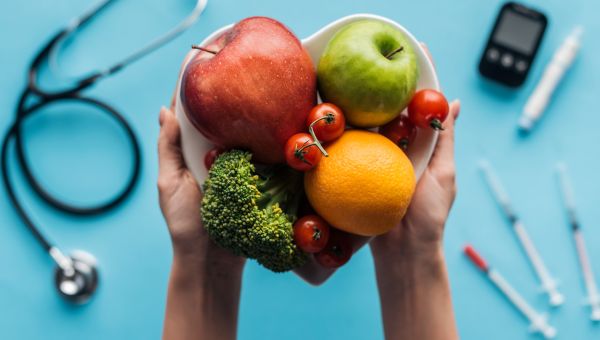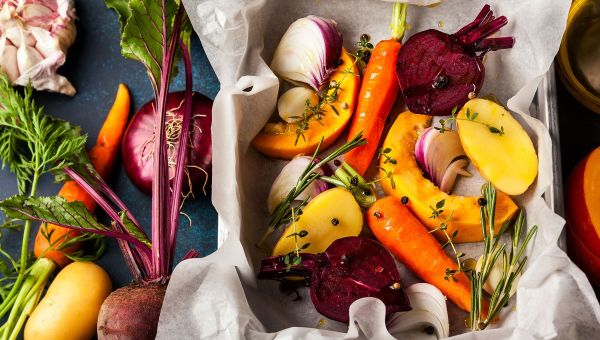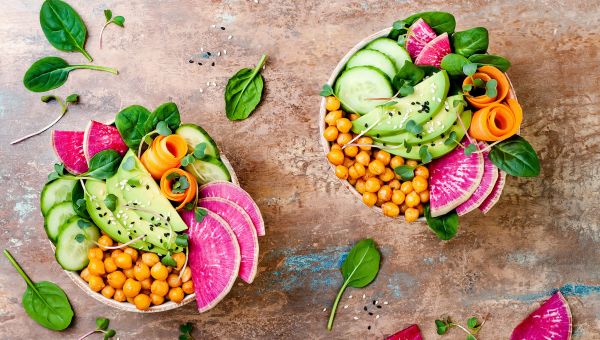5 reasons to adopt a plant-based diet
Learn about better digestion, lower heart disease risks, and other advantages to eating more fruits and veggies.
Updated on October 25, 2022

Plant-based eating encourages fruits, veggies, nuts, and whole grains, and limits processed foods, meats, and dairy. There are many different types. Vegans choose to cut all animal products from their diet. Others, like lacto-ovo vegetarians, skip meat, but eat eggs and dairy. People who eat fish but eliminate other meats are known as pescetarians.
There are different reasons for adopting a plant-based diet, from health concerns to environmental interests. Regardless of motivation, the benefits are the same. Compared to meat and other animal products, plant products are naturally lower in saturated fat and cholesterol. Consumption of plant nutrition has been linked to a lower risk of chronic illnesses, including heart disease, diabetes, and even some cancers.
A healthful, veggie-rich diet takes careful planning. Some plant eaters find it difficult to get enough essential nutrients like vitamin B12, found only in animal products, and protein. Getting the recommended nutrients from a plant-based diet is possible, however—it’s just a matter of knowing what (and how much) to eat.
You don't have to swear off meat, either. Many plant-forward diets include lean cuts of chicken and turkey, as well as fish such as tuna and salmon in moderation.

Lower heart disease risk
Heart disease is the leading cause of death among both men and women in the United States. Some research suggests that adopting a plant-based diet reduces saturated fat and cholesterol, which, in turn, can lower your risk of heart disease.
Diabetes and obesity are risk factors for heart disease and are more prevalent among people who eat meat. Likewise, research suggests vegetarians typically have lower rates of obesity than non-vegetarians.
Food undoubtedly plays a role in your heart health, but it’s not the only factor, and plant-based eaters may be healthier in other ways, too. People who eat less meat often drink less alcohol, smoke less, and are more physically active.

Manage type 2 diabetes
More than 9 percent of Americans have either Type 1 or 2 diabetes. Diet has long been used, in combination with exercise and medication, to manage type 2 diabetes. Following a plant-based eating regimen can help improve insulin sensitivity and maintain a healthy body weight, two key factors in preventing and treating the condition.

Improve digestion
Fruits, veggies, and some non-animal proteins, like beans, peas, and other legumes, tend to be high in fiber—especially compared to animal protein. One cup of black beans contains about 60 percent of the daily recommended value for women under 50, for example, while a 4-ounce serving of beef doesn’t have any fiber at all. Fiber-rich diets promote regular bowel movements and help boost bowel health in general, which is good for digestion.

Eat more nutrients
Expanding your diet to include more plant-based nutrition can mean eating more vitamins, minerals, and good-for-you fats. A cup of chopped, cooked broccoli, for example, contains 14 percent of the daily recommended vitamin A and 114 percent of the vitamin C you need. Both vitamins are beneficial for immune health. The veggie also has 184 percent of vitamin K, which helps blood clot properly.
Packing your plate with a variety of produce—in a plethora of colors—will help your body get the nutrients it needs.

Produce less waste
Plant-based diets are good for your health, but they may also benefit the environment. Compared to eating plans full of animal products, they tend to use fewer natural resources and don’t stress the environment as much. Grass-fed animals contribute to a small portion of animals raised for human consumption, and most livestock are fed at least partly with grain, which could be consumed by humans instead.

Join the veggie train
Whether you are ready to give meat up entirely or thinking about cutting back, start by adding more fruits and veggies to your plate.
For a good source or protein, try beans, an excellent alternative to red meat. Swap beef in some of your favorite dishes with beans—your body (and wallet) will thank you. Try:
- Replacing the ground beef in your next pot of chili with extra beans
- Making veggie tacos using succotash instead of beef
- Swapping your fatty beef patty for a portabella mushroom cap

American Heart Association. Vegetarian, Vegan and Meals Without Meat. Last reviewed January 27, 2017.
American Heart Association. How does Plant-Forward (Plant-Based) Eating Benefit your Health? Accessed October 19, 2022.
Tuso PJ, Ismail MH, Ha BP, Bartolotto C. Nutritional update for physicians: plant-based diets. Perm J. 2013 Spring;17(2):61-6.
Centers for Disease Control and Prevention. Heart Disease Facts. Last reviewed October 14, 2022.
Wang Y, Beydoun MA. Meat consumption is associated with obesity and central obesity among US adults. Int J Obes (Lond). 2009 Jun;33(6):621-8.
You W, Henneberg M. Meat consumption providing a surplus energy in modern diet contributes to obesity prevalence: an ecological analysis. BMC Nutrition. 2016. 2(16).
Baleato CL, Ferguson JJA, et al. Plant-Based Dietary Patterns versus Meat Consumption and Prevalence of Impaired Glucose Intolerance and Diabetes Mellitus: A Cross-Sectional Study in Australian Women. Nutrients. 2022 Oct 6;14(19):4152.
Olfert MD, Wattick RA. Vegetarian Diets and the Risk of Diabetes. Curr Diab Rep. 2018 Sep 18;18(11):101.
Barnard N, Levin S, Trapp C. Meat consumption as a risk factor for type 2 diabetes. Nutrients. 2014 Feb 21;6(2):897-910.
Jardine MA, Kahleova H, et al. Perspective: Plant-Based Eating Pattern for Type 2 Diabetes Prevention and Treatment: Efficacy, Mechanisms, and Practical Considerations, Advances in Nutrition, Volume 12, Issue 6, November 2021, Pages 2045–2055.
So D & Tuck CJ. Plant-based diets in gastrointestinal disorders: something, nothing, or everything? The Lancet Gastroenterology & Hepatology. December 2021. 6 (12), p992.
Harvard TH Chan School of Public Health. Fiber. Accessed October 19, 2022.
NIH: Office of Dietary Supplements. Vitamin A and Carotenoids. Updated June 15, 2022.
NIH: Office of Dietary Supplements. Vitamin C. Updated March 26, 2021.
NIH: Office of Dietary Supplements. Vitamin K. Updated March 29, 2021.
Harvard Health Publishing. Phytonutrients: Paint your plate with the colors of the rainbow. April 25, 2019.
Sabaté J, Soret S. Sustainability of plant-based diets: back to the future. Am J Clin Nutr. 2014 Jul;100 Suppl 1:476S-82S.
More On


video

article


video


video


video
